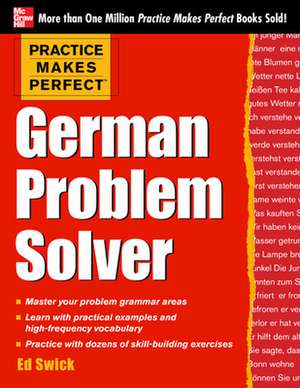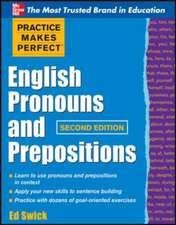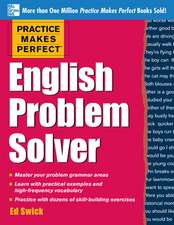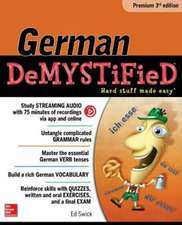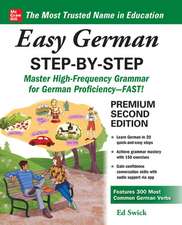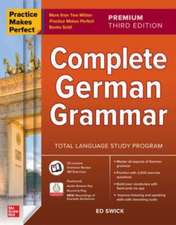Practice Makes Perfect German Problem Solver
Autor Ed Swicken Limba Engleză Paperback – 16 ian 2013
Practice Makes Perfect: German Problem Solver doesn't pretend that learning German is easy. Instead of covering the entirety of the language, it hones in on those areas where you might have difficulty--areas such as der vs. die vs. das, capitalization and punctuation, subject-verb agreement, determiners and adverbs of degree, and phrasal verbs.
Features:
- A variety of extensive exercises for practice
- Practical and high-frequency vocabulary
- Answer key provided for reference and quick feedback
Preț: 128.88 lei
Preț vechi: 140.24 lei
-8% Nou
Puncte Express: 193
Preț estimativ în valută:
24.66€ • 25.82$ • 20.41£
24.66€ • 25.82$ • 20.41£
Carte tipărită la comandă
Livrare economică 04-15 aprilie
Livrare express 28 februarie-06 martie pentru 43.01 lei
Preluare comenzi: 021 569.72.76
Specificații
ISBN-13: 9780071791151
ISBN-10: 0071791159
Pagini: 240
Dimensiuni: 218 x 274 x 15 mm
Greutate: 0.53 kg
Editura: McGraw Hill Education
Colecția McGraw-Hill
Locul publicării:United States
ISBN-10: 0071791159
Pagini: 240
Dimensiuni: 218 x 274 x 15 mm
Greutate: 0.53 kg
Editura: McGraw Hill Education
Colecția McGraw-Hill
Locul publicării:United States
Cuprins
1. Determining Gender
2. Haben, Sein, and Werden
3. Declensions with Ein-words and Der-words
4. Pronoun Choice by Gender
5. Special Masculine Nouns
6. Conjunctions and Word Order
7. Mancher and Solcher
8. Comparatives , Superlatives, and Irregularities
9. Modals and Double Infinitives
10. Sehen, Hören, Lassen, Helfen, and Double Infinitives
11. Prefixes
12. Irregular Imperatives
13. Verbs with Specific Prepositions
14. Categories of Irregular Verbs
15. Passive Voice vs. Participles as Adjectives
16. Subjunctive Mood
17. Numbers and Numerals
18. Infinitive Clauses
19. Relative Clauses
20. Writing
2. Haben, Sein, and Werden
3. Declensions with Ein-words and Der-words
4. Pronoun Choice by Gender
5. Special Masculine Nouns
6. Conjunctions and Word Order
7. Mancher and Solcher
8. Comparatives , Superlatives, and Irregularities
9. Modals and Double Infinitives
10. Sehen, Hören, Lassen, Helfen, and Double Infinitives
11. Prefixes
12. Irregular Imperatives
13. Verbs with Specific Prepositions
14. Categories of Irregular Verbs
15. Passive Voice vs. Participles as Adjectives
16. Subjunctive Mood
17. Numbers and Numerals
18. Infinitive Clauses
19. Relative Clauses
20. Writing
